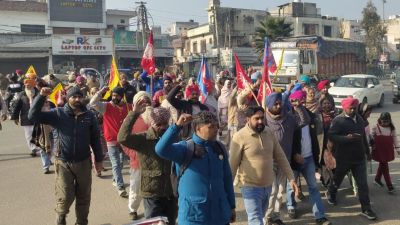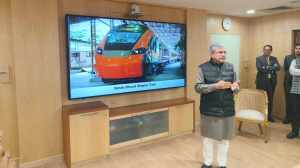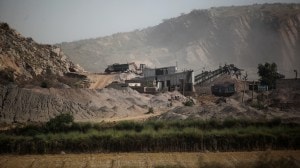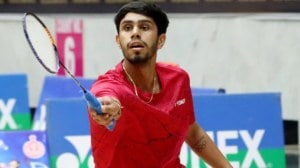Youth provides the answer
Travelling around the country, interfacing with university audiences, young professionals and intellectuals, I find to my dismay that a grea...

Travelling around the country, interfacing with university audiences, young professionals and intellectuals, I find to my dismay that a great degree of cynicism and negativism seems to have gripped the Indian mind at this critical juncture of our history. The shenanigans of a section of our political luminaries have led not only to a devaluation of politicians, but of politics itself. Time and again I have been anxiously asked by my audience what lay ahead for India, the implication being that the future is dark and there is hardly any light at the end of the tunnel.
This negative syndrome is extremely unfortunate. The fact is that against all odds we have maintained a viable and functional democracy for half a century. Political awareness has spread now to almost every village in this vast country; people are aware of their rights and demand a government that can provide them with the minimum needs of life food, clothing, shelter, health and educational facilities, gainful employment and security of lifeand property. The whole nation is on the move. Agriculturists have done wonders not only in North India but in States like Maharashtra, Andhra and Tamil Nadu, while with the burgeoning middle class trade and industry around the country have grown substantially. Our technological achievements have been impressive, and the products of our much-maligned educational system have made their mark abroad in highly competitive situations.
That all this should be happening despite the fragmentation and fracturing of our social cohesion and party structures is a tribute to the inherent resilience of the Indian people, and to our capacity for meeting fresh challenges as and when they arise. Despite all the corruption and criminalisation, travelling across the country renews one8217;s faith in the essential goodwill and collective wisdom of the Indian people. The entire nation cannot be held to ransom for the failure of the leadership, particularly as we have now reached a stage when a major breakthrough is within ourreach.
It is in this context that the elections to the 12th Lok Sabha have to be viewed. Although the proximate cause was the unpredictable action of the Congress president in pulling down two successive United Front governments, the fact is that the minority, multi-party coalition was never really viable. Not only was it dependent upon support 8220;from the outside8221;, which has invariably resulted in disaster, its internal contradictions were also insuperable and it was only a matter of time before it collapsed. While we have undoubtedly moved into an era of coalition governments, there is a qualitative difference between a minority coalition cobbled up after the elections, and a majority coalition based on a pre-electoral understanding.
With the emergence of three broad fronts before the polls, there is reason to hope that the elections this time will at last produce a stable coalition, so that Government can get on with the task of governing instead of spending most of its energy upon internecineconflicts and placating mutually contradictory forces supporting it from the outside.
It is worth recalling that each Ministry of the Government of India which holds sway over one-sixth of the human race, is in its scope and outreach equivalent to a huge multinational corporation which requires constant direction and creative leadership, specially in such areas as defence and agriculture, commerce and industry, education and health. It is unrealistic to expect this from the bureaucracy which is essentially trained to implement rather than initiate policy, or from small-time politicians whose consciousness rarely transcends narrow caste and communal considerations.
If India is to break out of its present shell and take its place among the great and powerful nations of the world, it will need leaders who can evoke the tremendous creative forces that are lying just below the surface of our collective consciousness and harness them to the task of national Renaissance and regeneration.
In an important wayour general elections are a referendum for the Prime Ministership. This time we have an interesting panel drawn from the three major parties 8212; Jyoti Basu from the CPM, A.B. Vajpayee from the BJP, and Sonia Gandhi from the Congress. Jyoti Basu has decades of experience in successfully running a coalition government in West Bengal. Vajpayee, charismatic and articulate, leads handily in almost every poll taken on who should be the next Prime Minister. And although Sonia Gandhi has declared that she is not seeking any public office, the fact that her entry has reinvigorated a collapsing party and that her campaign is drawing large crowds around the country will inevitably propel her into the Prime Minister8217;s chair if the Congress is in a position to form a government.
I have not mentioned the many candidates from the erstwhile United Front, because the Front itself has virtually ceased to exist and its centrepiece, the Janata Dal, is rapidly self-destructing, although the present incumbent Inder Gujral has amature mind and a clean image.
Taking a total view of the situation, there is no cause for despair. Every major political party has a crop of bright and dedicated younger politicians who, in the years ahead, can help to build a strong and united India. The Election Commission has introduced a number of positive reforms that will help to counteract the more blatant misuse of money and muscle power in the elections. If the voters turn up in large numbers and cast their votes in favour of candidates who have a clean record, we might finally have a Parliament that is able to do justice to the hopes and aspirations of the vast Indian electorate.
As we near the third millennium after Christ, humanity is inexorably moving into a global society, a transition more fundamental and decisive than any in its long and tortuous history on this planet. The question is whether India will simply be dragged along as a reluctant participant, or whether, with our unique pluralistic civilisational heritage, we can spearhead acreative symbiosis between material progress and cultural viability, the outer life of achievement and the inner life of spirituality, a fusion of the best that both East and West can offer in the emancipation of the human condition and enrichment of the human spirit. That is India8217;s real tryst with destiny.
The writer is a member of Parliament
- 01
- 02
- 03
- 04
- 05































